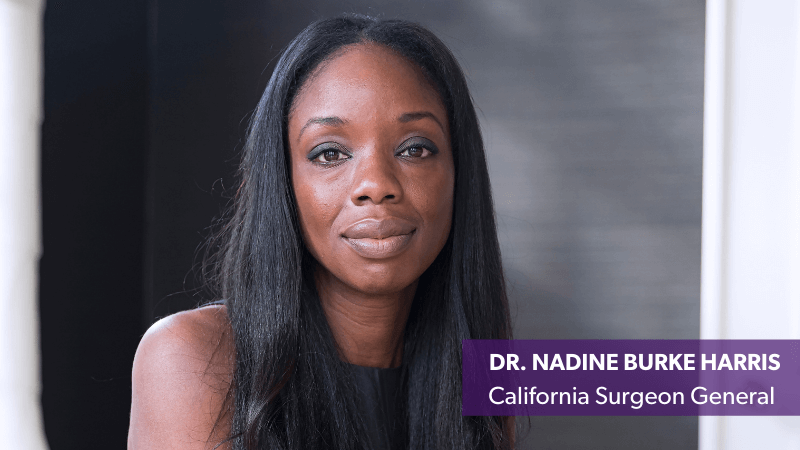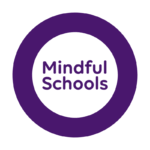Dr. Nadine Burke Harris, California’s first surgeon general, speaks about prescribing mindfulness as part of her clinical practice in a recent Edutopia interview.

When Dr. Nadine Burke Harris became California’s first-ever surgeon general in 2019, she highlighted Adverse Childhood Experiences (ACEs), health equity, and toxic stress as some of her key priorities. Today, the need for her work is far greater than anticipated, with an increasing number of Californians being impacted by the COVID-19 pandemic and extended periods of isolation and stress.
The encouraging news is that negative health impacts of ACEs can be prevented by regulating the body’s response to stress.
In a recent interview with Edutopia, Dr. Burke Harris spoke about the impact of trauma on lifelong mental and physical health and how mindfulness—and educators— can make a difference.
Adverse Childhood Experiences first came into the national spotlight in 1998, when a groundbreaking study from the Centers for Disease Control and Prevention linked experiences of childhood trauma—such as mental illness of a family member, household dysfunction, or abuse—to increased rates of heart disease, stroke, cancer and diabetes in middle aged-patients. Dr. Burke Harris’ own research in 2011 built upon these earlier findings by illuminating a connection between ACEs and learning and behavioral issues in youth, and revealing the startling impact of cumulative trauma—the more childhood trauma experienced, the more learning and behavioral issues were reported.

UPCOMING WORKSHOP:
Mindful Games for your Classroom
Wednesday, April 24, 2024 at 4pm ET
Join us for this dynamic 90-minute training to experience mindfulness through play to evoke curiosity, spark creativity, foster engagement, and support learning.
The encouraging news is that negative health impacts of ACEs can be prevented by regulating the body’s response to stress. Dr. Burke Harris highlights the benefits of mindfulness meditation, which can decrease levels of stress hormones such as cortisol and reduce the symptoms of the body’s active stress response by decreasing blood pressure and heart rate, “Educators can deliver the daily doses of healing interactions that truly are the antidote to toxic stress. And just as the science shows that it’s the cumulative dose of early adversity that’s most harmful, it also shows that the cumulative dose of healing nurturing interactions is most healing.”
“Educators can deliver the daily doses of healing interactions that truly are the antidote to toxic stress. And just as the science shows that it’s the cumulative dose of early adversity that’s most harmful, it also shows that the cumulative dose of healing nurturing interactions is most healing.” – Dr. Nadine Burke Harris
Mindfulness can be practiced in young children in shorter doses, and increase in length as they get older. Social-emotional learning also plays a part, says Dr. Burke Harris, “Giving children the tools to understand how to recognize what’s going on with them, then how to respond—especially to be able to calm their bodies down—truly is healing.”
“Please make sure to put your own oxygen mask on and practice real care for yourself so that you can be there for the next generation.” – Dr. Nadine Burke Harris
While teachers can play a role, Dr. Burke Harris is quick to point out the responsibility shouldn’t lay solely on a child’s educator to reverse the impacts of toxic stress. All community members, systems, and structures can make a difference.
Educators, Explore Mindfulness in our 101 Course
In 101: Mindfulness Foundations, learn practices that can resource you during the school day and daily life, with trauma-sensitive approaches for navigating emotons, working with thoughts and biases, and cultivating compassion and joy. Educators earn credits.
Bring Mindfulness to Your Classroom
In 201: Mindfulness in the Classroom, learn trauma-sensitive strategies to nurture social and emotional well-being in your classroom. Access the Mindful Schools K-12 Curriculum and Teaching Kit. Educators earn credits.
Dr. Burke Harris is a strong advocate for educator self-care, especially during the current stress caused by the pandemic, “We know that educators are the backbone of our society… In order for any of us to provide that safe, stable, and nurturing environment for the children that we serve, we have to practice self-care so that we can be available. Please make sure to put your own oxygen mask on and practice real care for yourself so that you can be there for the next generation.”
Educators, Explore Mindfulness in our 101 Course
In 101: Mindfulness Foundations, learn practices that can resource you during the school day and daily life, with trauma-sensitive approaches for navigating emotons, working with thoughts and biases, and cultivating compassion and joy. Educators earn credits.


